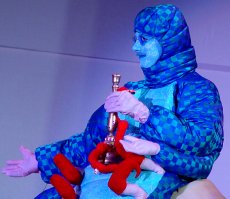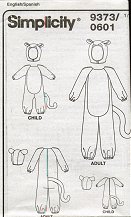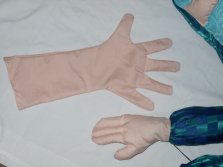
by Jim Kovalcin
The caterpillar started life, oddly enough, as Tigger.
We've always tried to start work on a new costume using an existing pattern, since there's no value beyond bragging rights for building it all from scratch. We knew from the Disney artwork that our caterpillar was going to have a darker back and a lighter belly, and as we looked through Donna's collection of costume patterns, we saw Tigger, with his orange back and yellow belly.
Of course, the legs and the tail had to go, and the torso was extended to become the body of the caterpillar. We also had to round the neck to fit a tall, stand-up collar that hooked in the back, which would cover the bottom of the hood and give the whole suit a more tubular look. And our color scheme was anything but orange and yellow.
We didn't have a coherent vision of what we wanted the fabric to be, so we spent some time looking around local fabric stores, hoping something would leap out at us. We saw many things that were "trippy," but none that achieved the understated look we were hoping for.
Eventually, we discovered the blue checkered nylon jacket-material you see, which had that timeless quality that it was really, really cheap - especially good since we were using five-plus yards of it. And a few weeks after that, we found the swirled white-on-light-blue fabric that became the belly. As it came together, we were really delighted how it all fit.
The suit, unlike the original pattern which called for velcro, had a zipper up the back. To attach it to the top of the mushroom, where the caterpillar went one way and I went the other, we lined the top of the mushroom with velcro, and placed several opposing tabs on the jacket, to keep it nominally in place.
The hood came mostly from the Tigger pattern, but, as always, we had to make some important changes. Most importantly, we removed the ears... The fabric was the same three-layer, quilted material as the jacket. It had flaps on the front that velcroed together under the chin, which we had to extend downward so that it would tuck under the collar of the jacket portion. Also, the rim around the face was gathered by hand to better fit my face. We needed to make sure that it didn't slip and accidentally show some of my not-normally-blue skin tone.
The make-up we wound up using was pure luck. We'd already sewed the costume when we finally decided to try out the make-up for the caterpillar. We'd been looking for, and failing to find, dark blue lipstick for some time, and decided to just see how the Caran D'Ache watercolor crayons Donna already had would look. Much to our delight, they worked as make-up great, coating my face nearly as well as greasepaint, without any of the hassle that comes with it. The light blue was a perfect match for the belly fabric we'd already used, and the dark blue saturated the lips and eyebrows just fine. And rather than fight with getting the coloring perfect around the eyes, we supplied the caterpillar with round, blue sunglasses. The swirls visible on my face were Caran D'Ache white, in curlicues designed to look like the swirls on the blue belly material.
The entire suit was quilted, with half-inch batting and a lining underneath the outer shell. To create the segmented look of the caterpillar, we sewed lines several inches apart in the body (back and belly) and in the arms. The whole suit was, predictably, very hot, and I spent as much time as I could out of it while in the Green Room.
For the extra pair of arms, we just made small tubes of the shell fabric, stuffed it with batting, and sewed the segment lines through it, matching where the lines were on the real sleeves. We made gloves by tracing an outline of my hand, and made miniature hands by cutting out small mittens, and then sewing finger lines in afterwards. The false arms swung freely, but were tethered to the sleeves by thin, black button thread, virtually invisible from stage. Thus, the second set of arms mimicked the main set perfectly. I made sure to make lots of sweeping arm gestures in the presentation to show this off.
The feet, the same pink color as the gloves, were simple tubes cut to have a slight bend at the knees. They were stuffed with batting and sewed to the juncture of the back with the belly area. We decided to do the feet separate from the shoes to decrease the complexity of them. I didn't want to have to sew red felt shoes to pink muslin. So the shoes wound up being removable.
We originally considered gold for the shoe color, as in the movie, but decided that red just looked better, and formed a better contrast with the rest of the suit. So we traced out the side of a curly-toed shoe in felt and put on a long, tapered sole to make the shoes. The gold laces that you can see were gold cross-stitch floss laced in and tied in a bow.

Illustration from the Lewis Carroll book

Cel from the Disney movie

Cel from the Disney movie

Simplicity Tigger pattern


